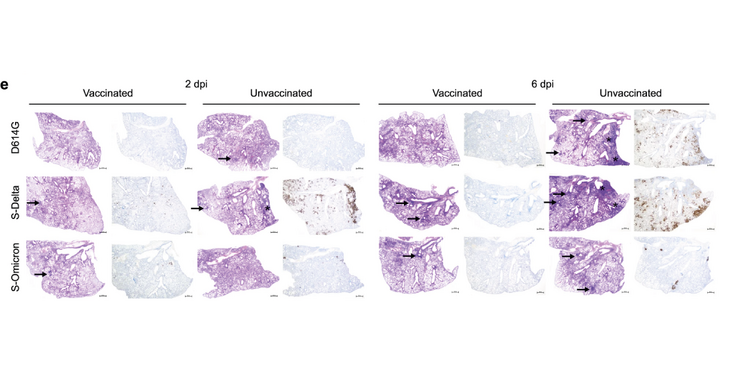The Thiel lab with collaborators studied the phenotype of the SARS-CoV-2 variant Omicron-BA.1 in several models of infection and the contribution of the spike protein to this phenotype. These experiments included assessing the evasion of the immunity provided by mRNA vaccines desgined against the original virus. Overall the experiements revealed the mutations in the spike protein as a major contributor to the Omicron-BA.1 phenotype. Their findings were published in the article " The spike gene is a major determinant for the SARS-CoV-2 Omicron-BA.1 phenotype" in Nature Communications.
Abstract
Variant of concern (VOC) Omicron-BA.1 has achieved global predominance in early 2022. Therefore, surveillance and comprehensive characterization of Omicron-BA.1 in advanced primary cell culture systems and animal models are urgently needed. Here, we characterize Omicron-BA.1 and recombinant Omicron-BA.1 spike gene mutants in comparison with VOC Delta in well-differentiated primary human nasal and bronchial epithelial cells in vitro, followed by in vivo fitness characterization in hamsters, ferrets and hACE2-expressing mice, and immunized hACE2-mice. We demonstrate a spike-mediated enhancement of early replication of Omicron-BA.1 in nasal epithelial cultures, but limited replication in bronchial epithelial cultures. In hamsters, Delta shows dominance over Omicron-BA.1, and in ferrets Omicron-BA.1 infection is abortive. In hACE2-knock-in mice, Delta and a Delta spike clone also show dominance over Omicron-BA.1 and an Omicron-BA.1 spike clone, respectively. Interestingly, in naïve K18-hACE2 mice, we observe Delta spike-mediated increased replication and pathogenicity and Omicron-BA.1 spike-mediated reduced replication and pathogenicity, suggesting that the spike gene is a major determinant of replication and pathogenicity. Finally, the Omicron-BA.1 spike clone is less well-controlled by mRNA-vaccination in K18-hACE2-mice and becomes more competitive compared to the progenitor and Delta spike clones, suggesting that spike gene-mediated immune evasion is another important factor that led to Omicron-BA.1 dominance.
Read the Publication in Nature Communications (Open Access)
Abstract, figure and title from Barut, Halwe, Taddeo, Kelly et al. (2022) Nat Commun published under a CC BY 4.0 license.
